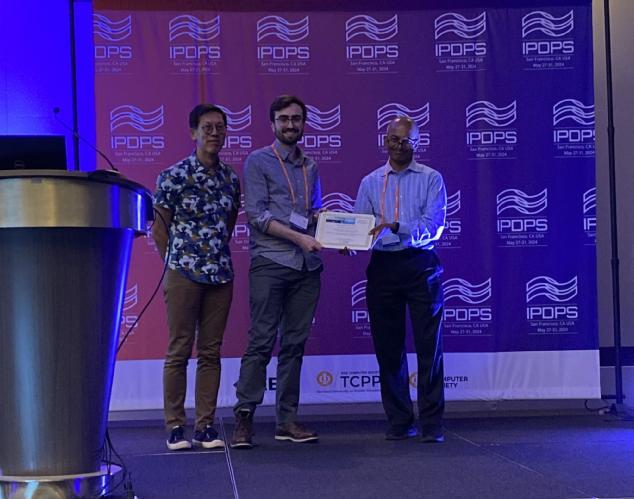Artificial Intelligence and Human-Centred Computing News
Best Paper Award at IPDPS 2024

Toby Flynn, PhD student in the department's High-Performance and Scientific Computing group, supervised by Prof. Gihan Mudalige together with Dr. Robert Manson-Sawko at IBM Research UK received the best paper award at the 38th IEEE International Parallel and Distributed Processing Symposium (IPDPS 2024) last week in San Francisco US. IPDPS is one of the most prominent and high ranking conferences in parallel and distributed computing, now in its 38th year.
The paper titled "Performance-Portable Multiphase Flow Solutions with Discontinuous Galerkin Methods", details the development of a new performance portable solver workflow using Discontinuous Galerkin (DG) methods for developing multiphase flow simulations based on the OP2 domain-specific language. Results demonstrate scaling on both CPU and GPU systems including UK's national supercomputer, ARCHER2 at EPCC Edinburgh and the European Petascale Supercomputer, LUMI hosted by CSC Finland. The work is a collaboration with IBM Research UK supported by an iCASE award funded jointly by IBM and EPSRC.
The paper pre-print is available here.
Computer Science Alumni Reunion Conference 2024
The Department of Computer Science is hosting the alumni reunion conference on March 22nd - bringing together current and past students, along with academics and researchers to enjoy a day of talks and demonstrations.
Mustafa Yasir Presents Project Work at the 3rd Annual Workshop on Graph Learning Benchmarks at KDD 2023
Mustafa Yasir, a former Warwick Department of Computer Science student who graduated in Summer 2023, wrote up and presented an academic paper on the work carried out as part of his third year project. The paper was accepted to the 3rd Annual Workshop on Graph Learning Benchmarks at KDD 2023, and was presented in California by Mustafa.
Mustafa's third year project idea, supervised by Dr Long Tran-Thanh and titled 'Extending the Graph Generation Models of GraphWorld', started whilst he was interning at Google last summer. Mustafa contacted some researchers at the company working in the Graph ML space, to ask for any relevant project ideas. He bumped into a team who had just published GraphWorld: a tool to change the way Graph Neural Networks are benchmarked, by creating synthetic graph datasets through graph generation models – as opposed to using real-world datasets that are limited in their generalisability and present a major issue facing the field of Graph Learning.
However, since GraphWorld only used a single graph generation model in this process, Mustafa integrated two additional models with the system, ran large-scale GNN benchmarking experiments with these models and published his code to Google’s official GraphWorld repository. The project provides a significant advancement to researchers across the field looking to benchmark models and guide the development of new architectures.
Dr Long Tran-Thanh commented:
What Mustafa and the GraphWorld team has been working on is very important for the machine learning and AI research communities. In particular, there has been a vocal criticism against the whole field that most models are trained on the same public datasets (e.g., ImageNet, MNIST, etc), therefore are not diverse enough. One way to mitigate this issue is to generate realistically looking synthetic data. This need is especially of importance in within the graph learning community. GraphWorld’s aim is to address this exact problem by creating a powerful and convenient tool that can generate a diverse set of graphs, ranging from large social network-style graphs to molecule-inspired ones. Joining this project with the Google researchers is a huge opportunity for Warwick students to participate in a very impactful project.
